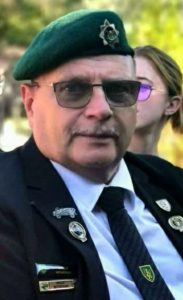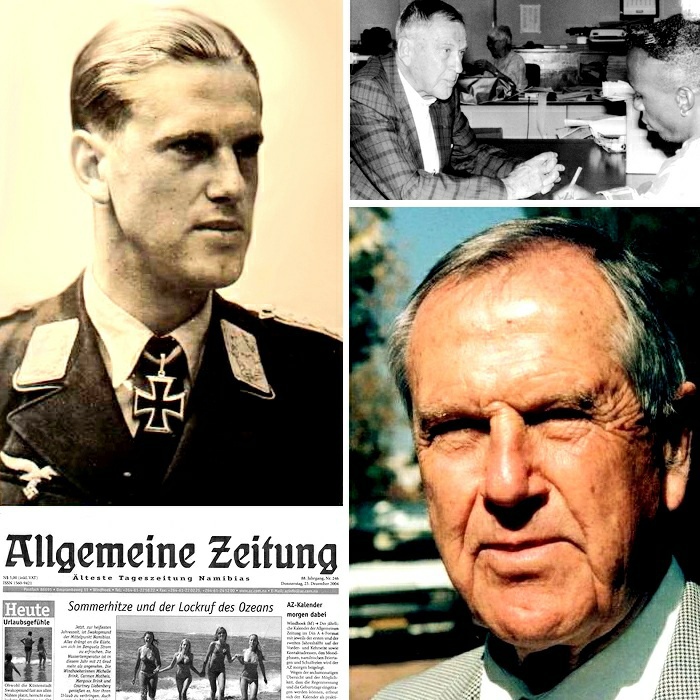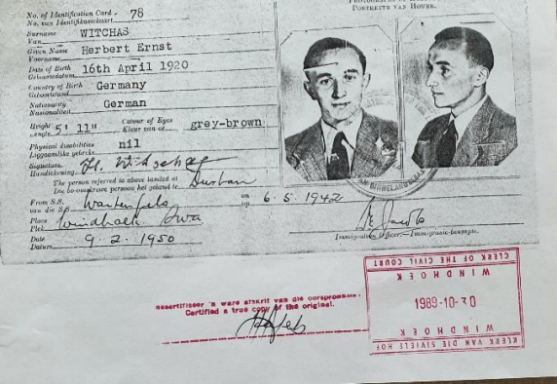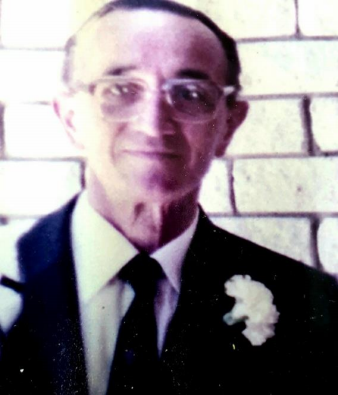MY FATHER THE SPY: AGENT OF THE REPUBLICAN INTELLIGENCE (RI) AND THE BUREAU FOR STATE SECURITY (BFSS): 1964 TO 1978
Wolfgang Witschas

Abstract:
My father, Herbert Ernst Witschas, worked as an agent for the Republican Intelligence (RI) and the Bureau of State Security (BfSS) in Windhoek, then South West Africa (SWA), from 1964 to 1978.
Key words
Spy
South African Police (SAP) Security Branch
Republic Intelligence (RI)
Bureau for State Security (BfSS)
Herbert Ernst Witschas
Windhoek
South West Africa (SWA)
Ben Burger
West German Consulate General Windhoek
Deutsche Höhere Privat Schule (DHPS)
South West Africa Peoples Organisation (SWAPO)
Allgemeine Zeitung
Kurt Dahlmann
German Business people in SWA
Introduction
The fact that my father, Herbert Ernst Witschas, worked as an agent for the Republican Intelligence (RI) and the Bureau for State Security (BfSS) in Windhoek, then South West Africa (SWA), from 1964 to 1978, is only known to a select few number of people, of which the majority have passed away over the years. This is my reason why I decided to reveal the truth
Before the story of his association with RI and the BfSS can be told, it is necessary to venture back to his early years: 1920-1939, World War II: 1939 to 1945 and from 1945 to the 1970s (SWA).
Early Years: 1920 – 1939
My father was born on 16 April 1920 in the rural town of Kreba, Silesia, Germany (now part of Poland). He spent his entire young life until 1939 in Kreba. After leaving school he joined the German Merchant Navy in Hamburg in January 1939. He joined the German merchant ship Wartenfels
In September 1939 the Wartenfels was ordered to sail to the nearest neutral port as World War ll had started when Germany had invaded Poland and Britain had declared war on Germany. She ship was near the red sea and sailed to the port of Massawa, Italian Eritrea.
World War II: 1939 – 1947
A week after WWII had started (08/09/1939) a total of 11 German merchant ships had docked in the port of Massawa. The Italians at that stage were neutral and did not want to anger the British, all German persons were temporary “interned” to their ships, until Berlin and Rome had decided their fate.
When Italy declared war on Britain and the seamen of the German Merchant ships were ordered to form a German – Eritrea Motorised Combat Unit. They received military training and were equipped with Italian weapons. By the time they were ready for combat, the British were invading Eritrea from Abyssinia and the German unit were ordered to defend Massawa.
On 26 February 1941 the German Merchant ships Captains however decided to board their ships, leave Massawa and try to break through the British navy blockade into the Indian ocean. The ship where my father was sailing on, the Wartenfels, was lucky and slipped through the British naval blockade and were enroute to Madagascar. Near Madagascar the ship was attacked and torpedoed by the Royal Air Force (RAF). The survivors were picked up by a British Royal Navy ship and taken prisoner and taken to Durban.
All the German POWs were first taken to the Baviaanspoort camp near Pretoria, where the Italian POWs were held but then transferred to Andalusia Internment Camp (now Jan Kemp Dorp) in the Northern Cape. They stayed in Andalusia until mid 1942 when they were transferred to Koffiefontein camp in the Orange Free State (OFS). In late 1944 they were transferred to Jagersfontein camp also in the OFS, were they stayed until their release in 1947.
During his stay in Andalusia camp my father studied and first obtained the Senior Certificate (now the Matric Certificate) and what then was a business course. He met many interned Germans from SWA amongst them his future father-in-law, my Grandfather, and many future businessmen, lawyers, farmers and teachers.
South West Africa (SWA): 1947 – 1970s
Businesses in South Africa and especially SWA were looking for skilled labour. He applied for work and got employment with a German Business man, Orlofsky in Windhoek.
There he met my mother and in 1949 they were married.
In 1951 my parents were managing the Aris Hotel (small country hotel) 30 km south of Windhoek on the Windhoek, Rehoboth main Road. In the vicinity of Aris diamond mine prospecting took place and copper mining. On of the regular visitors to the hotel were two South African Police (SAP) detectives who investigated diamond related crime. The Senior was a Sergeant, Ben Burger. The detectives suspected that illegal diamond deals were conducted near and at the hotel in the adjacent rooms. They asked my parents for assistance with their investigations i.e. act as informers, which they agreed to. The work relationship developed into a friendship over the time.
In 1957 my father bought a delicatessen shop in Windhoek and truly entered the business circle. He was also very active in the German community, involved in the Deutsche Höhere Privat Schule (DHPS), which opened doors to the then West German Consulate General in Windhoek, even contact with the Consul himself and the senior Consular personnell. He was well connected in the German business circle, the Lions, Round Table, the Lutheran Church and had good relations with the Jewish community, especially business and cultural leaders.
He occasionally had contact with his old SAP friend, Ben Burger and had established contact with other senior police officers such as (then) Brigadier Theo Crous, then Divisional Commissioner for SWA.
After South Africa became a republic, he applied officially for South African citizenship to be naturalised , for the whole family although my brother, sister and myself were born in SWA then a United Nations C-mandate under South Africa and thus we are automatically SA citizens and my mother was born in SWA in 1925 when SWA was a C-mandate of the League of Nations administered by South Africa. While the application was still being processed, he was contacted by Ben Burger, who had been transferred to the SAP Security Branch to be interviewed wrt the application. It was during this interview that Ben Burger “officially” recruited my father as an agent. Burger explained to my father that his excellent contacts in the German community, West German Consulate General in Windhoek, made him a perfect asset and the state needed people to help to determine any possible threat the new Republic is going to face since independence (citizenship was granted to my parents). It was interesting to note that my father never referred to what rank Burger had then.
Tasking by Ben Burger
West German Consulate General Windhoek:
It was suspected that the consulate housed members of the West German Foreign Intelligence Service, “Bundesnachrichtendiens (BND)”, hidden is various sections, who were suspected to have contact with SWAPO leaders within SWA and SWAPO sympasiser amongst the German population, especially business men, Lutheran and Roman Catholic clergy, and Academics.
Visa application by SWAPO leader to visit West Germany.
West German Diplomats that visited the Consulate from West Germany and the German Embassy in Pretoria from time to time
Individuals:
Kurt Dahlmann
Background:
Kurt Dahlmann, a former highly decorated German Luftwaffe officer during WWII, member of the Bundeswehr, post WWII until 1957 and first editor and then chief editor of the German daily newspaper, “Allgemeine Zeitung” in Windhoek.
Dahlmann immigrated to SWA in 1958 and became the editor and then in 1960 the chief editor of the Allgemeine Zeitung. He was an outspoken activist who was pro SWAPO and anti South Africa. It was suspected that he was an agent of the BND.
Political activism:
On 11 October 1965 Dahlmann testified under cross-examination on the topic of political parties in SWA, at the International Criminal Court (ICC) in The Hague. Writing under the pen name Stachus, symbolised as a potted cactus with an oblique dip pen, Dahlmann was adamant about the fleeting nature of apartheid. He wrote many editorials on this topic suggesting ways that Namibia and South Africa should address the issue of inevitable black rule in both countries.
His views so granted Diether Lauenstein, who had recently purchased the paper, that he was fired from the Allgemeine Zeitung newspaper in 1978. Dahlmann alleged that Lauenstein fired him on 20 April 1978, the birthday of Adolf Hitler. Lauenstein was adamantly opposed to Namibian independence, and his enthusiastic support for apartheid as well as the continued South African rule of the territory placed him at odds with Dahlmanns’ own views, which were generally in favour of independence and majority rule. Dahlmann would later state publicly that the acquisition of the paper by Lauenstein was at the behest of the South African government with the view of expanding its dominance over Namibia.
Dahlmanns’ Namibian activism was based on three premises: the end of apartheid, continued independence vs integration with South Africa, and universal, race- and gender-independent, suffrage for all Namibians.

Kurt Dahlmann: German Luftwaffe officer, lawyer, journalist and editor
https://en.m.wikipedia.org/wiki/Kurt_Dahlmann
General environmental scanning amongst the population on a continues basis


HE Witschas
In 1966 my father became an SAP Reservist in Windhoek along with mostly other German South Africans during a drive by the Divisional Commissioner, Brigadier Theo Crous, to establish reservists units in all the major towns in SWA
Being a reservist provided my father of a perfect cover to visit the Police station regularly without attracting attention.
My father’s business, Herring’s Delicatessen, was situated not far from the police station in Bahnhof Street opposite the Recreation Club of the South African Railways & Harbour (SAS & H), which was also convenient.
Elucidation
In his book, “Die Buro, Genl. Lang Hendrik van den Bergh en die Bureau vir Staatsveiligheid” by Henning van Aswegen; in pages 101,104, 147 & 168, he refers to the predecessor of the BfSS, the RI, that they were represented in Windhoek, by Ben Burger and Swanepoel.
The SAP Station in Windhoek, on the corner of Kaiser and Bahnhof Straße, indeed had an office on the first floor in the west wing, right above the charge office, for gun licence applications in the left corner. The rest of the wing was occupied by detectives of the Criminal Investigation Department (CID). This vould be why the RI office used the Gun licence office, as cover.
The BfSS later occupied offices on the third floor in the Nictus building further up to the north from the police station in Kaiser Straße. These offices were later also occupied by the National Intelligence Service (NIS) until 1983. In 1981 when I joined NIS, I worked at these offices.
References:
Google:/https://www.namibiana.de/namibia-information/who-is-who/autorem/infos-zur-person/kurt-dahlman.html
Google:/https://en.m.wikipedia.org/wiki/Kurt_Dahlmann
Book:
“Die Buro”, Genl. Lang Hendrik van den Bergh en die Bureau vir Staatsveiligheid: Henning van Aswegen
Pages: 101,104, 147 & 168
Life story of Herbert Ernst Witschas, as narrated by Wolfgang Witschas
